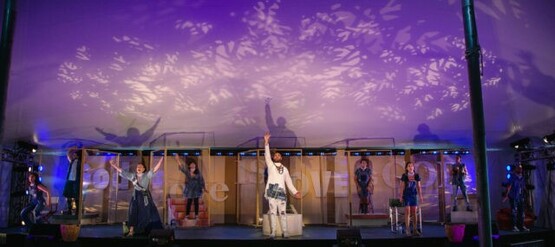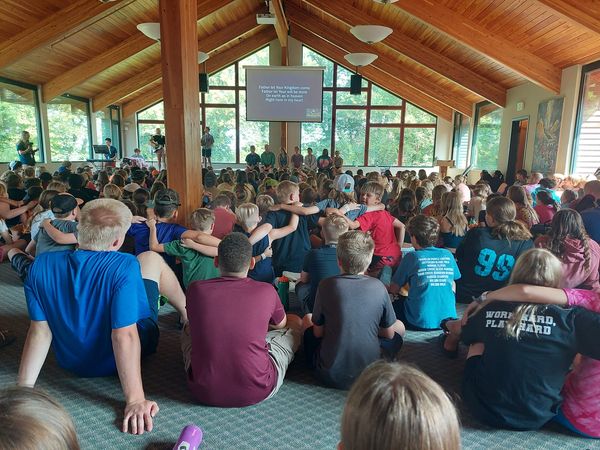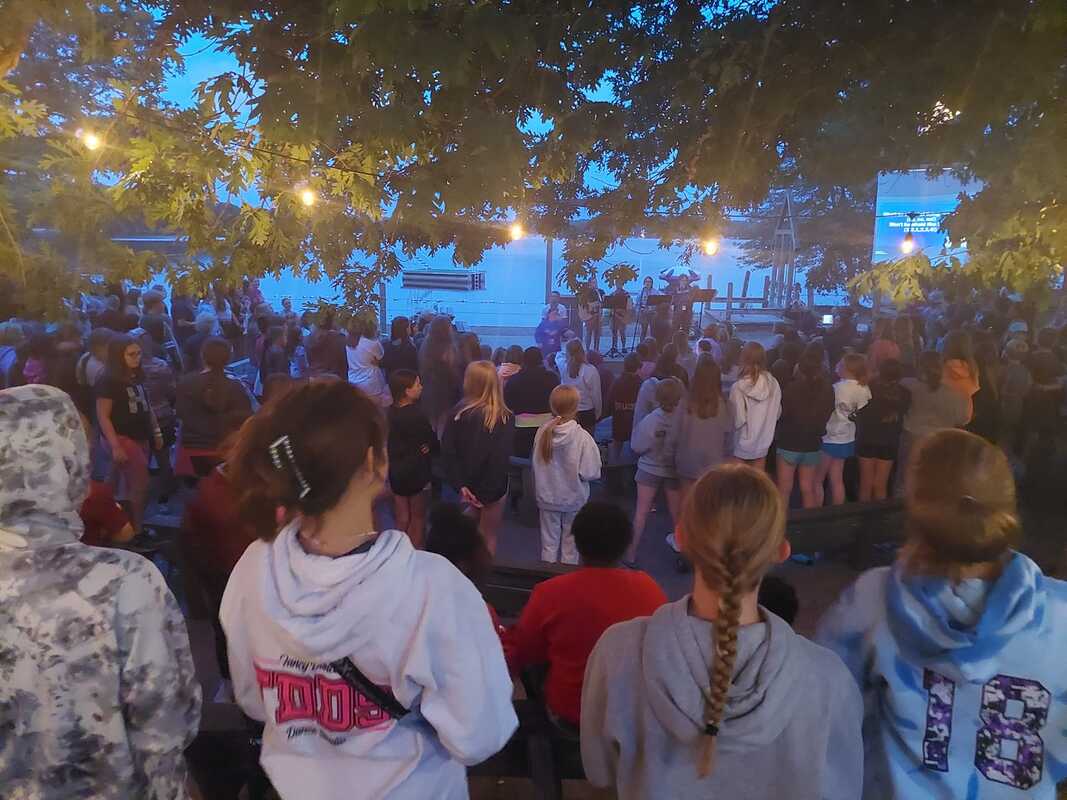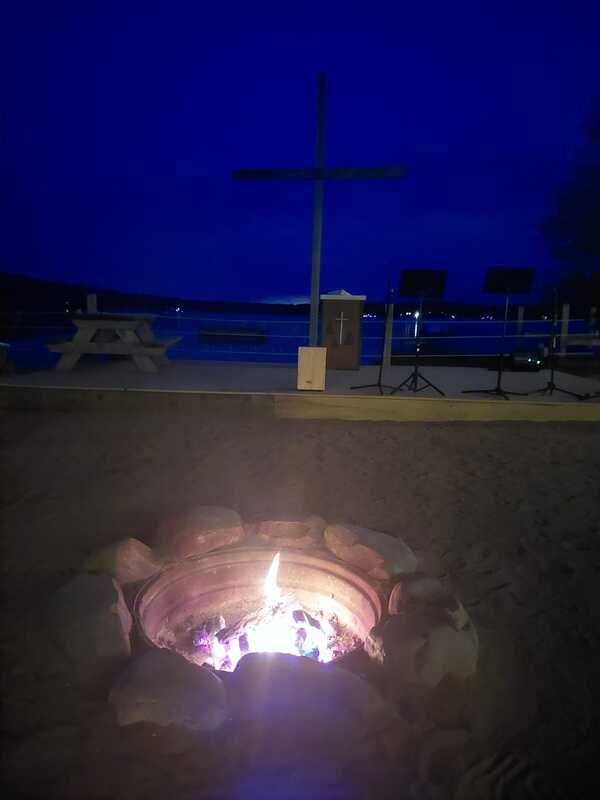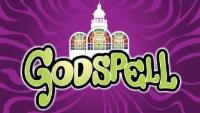 Community Life – Adult Social Group Event Sunday, August 13 for the 2:00 performance Our goal is to offer opportunities for fellowship and ministry among adults in a social setting. Our first foray is going to be attending Godspell by Artistry at the Bloomington Civic Center Schneider Theater. For groups of 10 or more, tickets are $38.00, Invite an unchurched friend! We need to purchase tickets together. Please contact Helen Schatzlein at [email protected] by July 27th to let her know that you’ll be attending. The $38 payment for your ticket must be made to St. Luke’s and given to Heather Kambeitz by July 30th, or click here to pay online through Simply Giving. Note that the payment is for Godspell In an era of uncertainty and isolation, Godspell’s message of hope and unity has never been more relevant. History and Impact of “Godspell” Godspell. Originally conceived in 1970 by John-Michael Tebelak when he was a student at Carnegie Mellon, Godspell was born of collaboration and a desire to spread a joyful message. With Tebelak’s vision and Stephen Schwartz’s music, Godspell quickly became a cultural phenomenon. Godspell‘s Origin Tebelak began writing Godspell for his Master’s thesis. According to Carol de Giere’s The Godspell Experience (2014), “his plan was to re-approach the Biblical parables and texts with the innocence of a child, and to play with the material as if it was a school recess” (de Giere 58). The first iteration was titled The Godspell and consisted solely of the text of The Gospels. The cast, clowns 1-10, were encouraged to experiment and play with the text—to make it their own and bring life to the words. This level of freedom and playfulness along with the vision and input from Tebelak truly transformed the text from discordant Bible parables into a play. With music written by a fellow student for pre-selected hymns, and a three-person band The Godspell premiered in December of 1970. Godspell was given the chance at a New York City debut at La MaMa, an Off-Off-Broadway venue known for experimental theatre. Most of the original cast and some of the original creative team from Carnegie Mellon were able to reprise their roles. No formal script had been created after the Carnegie Mellon shows, and so a new round of experimentation, improvisation, and play commenced. The show was yet again a success. Producers Joseph Beruh and Edgar Lansbury saw the potential in the piece and quickly signed on. Shortly thereafter, everyone began preparing Godspell for a move to The Cherry Lane Theatre. In order to transform this experimental work, new music was a must. Stephen Schwartz, a fellow Carnegie Mellon graduate, was asked to join the team and compose a new score for the show in just five weeks. With an eclectic mix of styles and transitioning of longer monologues into music, Godspell began to transform into its final state. In 1971 it opened to rave reviews. It transferred to the Promenade Theatre and ran for over 2,000 performances. The first Broadway production of Godspell opened in 1976 at the Broadhurst Theatre. Throughout the 1970s, touring and international productions emerged from London and Toronto to smaller regional theatres such as Berkshire Theatre. Godspell’s cultural importance was undeniable. Cultural Impact The creation of Godspell was driven by young artists—college students—who had grown up in the midst of the cultural revolution of the 1960s. Influenced by The Civil Rights Movement, the second wave of feminism, the sexual revolution, and the development of new countercultures aimed at questioning authority and fighting for freedom, Godspell was radical. Godspell revisits the idea of Jesus as a revolutionary figure. One who challenged authority and preached a new, radical message to the world: “love your enemies and pray for your persecutors.” Tebelak in a 1975 interview with Dramatics magazine stated that he, “wanted to make [Godspell] the simple, joyful message that I felt the first time I read [The Gospels] and recreate the sense of community.” Godspell was written in reaction to the world and to those in authority who saw a young Tebelak, in his “hippie” attire, leaving a church and assumed he had snuck in to loiter rather than to listen. One of the most brilliant aspects of Godspell is its ability to be relevant to any time or place in which it is staged. The original cast were named only as clowns, which afforded them a level of theatrical freedom and honesty. Using clowns and comedy also afforded a degree of innocence, playfulness, and humor to the story that is essential to the balance of the show. As the show evolved, the characters were named after the actors who originated them, with the exception of Jesus and Judas/John the Baptist. This helped to illustrate the importance of bringing something of the self to each individual “clown.” As the show moves onward, each individual begins to join in to the community through song. As productions began to spread across the country and the globe, it was imperative that a member of the original New York cast was there to help maintain the spirit and essence of the show. For Berkshire Theatre’s 1975 production, Howard L. Sponseller, Jr. came aboard as an alternate cast member and spokesperson for the spirit of the production. Sponseller was a classmate of Tebelak and performed in New York as well as overseeing the Toronto production in 1972. Godspell was a hit in large part because it showcased the voices of a new generation. “It was a time when the so-called ‘generation gap’ caused confusion and lack of trust between young people and older adults” (de Giere 263). Today, the generation gap that exists is more extreme than ever, with the next generation—Generation Z—set to be the most ethnically and racially diverse in the nation’s history. When the show was revived in 2011, one of the main reasons cited for the revival was the divisive climate in the nation. The ability of Godspell to profoundly impact audiences has only grown throughout the years. What better way to address the divide amongst the population than with a musical about love, community, and connection? Much Thanks to… Berkshire Theatre Group, for their permission to use their blog: https://www.berkshiretheatregroup.org/history-and-impact-of-godspell/#
0 Comments
 What does it mean to be grateful? Gratefulness is a feeling of appreciation by a recipient of another's kindness. This kindness can be gifts, help, favors, or another form of generosity to another person. The word comes from the Latin word gratus, which means "pleasing" or "thankful". For what are you grateful? Sunday’s readings pointed out much for which we should be grateful. From our Isaiah 40:21-26 reading:
And from the Gospel of John 1:1-14:
All of these things to be grateful for in just 20 of the 31,102 verses found in the Bible. Imagine how many more are found in scripture? The problem is that many people do not read their Bibles. However, God knew that it wasn’t the best source of communicating with us that is why the Word was made flesh and dwelt among us. Jesus, God with us, was born, raised in a family, and lived his life as the embodiment of God’s Word. As followers of Jesus we are called to be witnesses of God. We do so best when we recognize for that for which we are grateful, and have the desire to help others do likewise as we share kindness, gifts, help, favors, or another form of generosity. In doing hopefully gratefulness is felt by that person and they can join us in giving thanks to God and passing on gratefulness. I encourage you to take a moment to write a quick list of which you are grateful; in fact, I invite you to do so every day. Many people keep a gratitude journal, it helps them focus on what is good and going well in their lives, and in doing so gives them a foundation and strength when facing difficulties in life. Below are the responses from those who shared theirs on Sunday. Are you surprised by the list? Are the things you are grateful for already listed? If not, share yours in the comments. (A number in front indicates multiple responses). May you be grateful for all the blessings you have received, giving thanks in Jesus’ name. Amen
 Youth: 4th-12th Grade, July 9-14. Seeds: 1st-3rd Grade July 14-16 Summer Bible Camp = increased faith life and church involvement “Life up your eyes and look to the heavens: who created all these? The Lord brings out the stars one by one and calls forth each of them by name. Because of God’s great power and mighty strength, not one of them is missing.” – Isaiah 40:26 Camp engagement was the most frequent response among rostered ministers age 45 and younger who grew up in the ELCA. Among this group, 71% attended Lutheran Outdoor Ministry (LOM) summer camp and 60% served on LOM summer camp staff. A remarkable 67% of this subgroup agreed that their camp experiences were instrumental in their call to rostered ministry. I’m no longer in that age range, but I attended Bible Camp and served as a Counselor, Adventurist, Program Director and Site Director in LOM. I am a pastor primarily because of summer Bible camp. A quote I share with camp staff is true for me. “You can’t change a kid’s life in a week, but you can give them the week of a lifetime.” For me Jesus became more personal, more real, a relationship instead of an activity when I attended camp, both as a camper and as summer staff. I asked the St. Luke’s youth last night prior to campfire worship why youth should go to camp. Their responses were much like mine as a youth:
Above is the theme verse for the week. Just as God creates and calls forth the stars, God does so with each one of us. So I read the verse like this: “When I look to the campers, who created all of these? The Lord brings forth each child one by one and calls forth each one by name. Because of God’s great power and mighty strength, not one of them is missing.” If you want to join in the Bible Studies, please click: HERE Know that all of you are in our prayers. Please keep us in yours. Would love to hear your prayers and your camp stories share it in the comments.  Today is the Celebration of Independence for the United States. I have a second cousin who reminds anyone who greets him with “Happy Fourth of July!” that we are not celebrating a date, but an ideal. The United State’s grand experiment of democracy continues, with all of its faults and failings. The same could be said about Christianity, which also has many faults and failures – first and foremost the desire for a Christian nation. I will continue to point out that Jesus, the Son of God, never desired to establish an earthly government. We hear him declare during his arrest, “Put your sword back into its place, for all who take the sword will die by the sword. Do you think that I cannot appeal to my Father, and he will at once send me more than twelve legions of angels? But how then would the scriptures be fulfilled, which say it must happen in this way?” – Matthew 26:52-54 This coming week we will continue our series on the Book of Isaiah. The passage we are studying is often read on Christmas Eve, “For a child has been born for us, a son given to us; authority rests upon his shoulders, and he is named Wonderful Counselor, Mighty God, Everlasting Father, Prince of Peace. Great will be his authority, and there shall be endless peace for the throne of David and his kingdom. He will establish and uphold it with justice and with righteousness from this time onward and forevermore.” – Isaiah 9:6-7 It is in this reading that I hear what the work of the church is to be – peace, justice, and righteousness – Godly righteousness, not self-righteousness. It is the latter that Paul is speaking against to the Galatians. Chapter 5 opens with “For freedom Christ has set us free. Stand firm, therefore, and do not submit again to a yoke of slavery.” (Vs. 1). Paul is speaking against other missionaries who wanted to bring the Galatians under the constraint of a new religio-cultural system of domination. Commentator Richard Hays shares the following in the New Interpreters Bible pg. 310 Paul’s letter is a clarion call to stand firm in the freedom won by Christ. Beware of confusing the freedom of which Paul speaks with nationalistic discourses about freedom nor about rugged individualism or an inner liberty of the conscience or the will. Freedom in Christ manifests itself through the formation of concrete communities where the old barriers of nation, race, class, and gender are overcome in communion at the one table. The freedom Paul proclaims is to be embodied in the corporate life of the church. Freedom in Christ says, “It is no longer I who live, but it is Christ, who lives in me.” (2:20). Freedom in Christ is a gift, not an achievement. Where freedom is so understood it leaves room for genuine diversity. We need not be bound by anxiety about pleasing others, or meeting expectations imposed on us by those who fancy themselves the guardians of order. We are accountable only to God, in whose service is perfect freedom. The freedom that we know now in Christ is a future-oriented sign, a foretaste, a pointer to the new creation. So let us celebrate the Independence of the United States, but even more so the celebrate the greater freedom found in Jesus. Paul directs us how to best do that at the end of the 5th chapter, words that as a Christian and also as fellow citizens would be good to live by… “For you were called to freedom brothers and sisters, only do not use your freedom as an opportunity for self-indulgence, but through love become slaves to one another. For the whole law is summed up in a single commandment, ‘You shall love your neighbor as yourself.’ If however you bite and devour one another, take care that you are not consumed by one another…By contrast, the fruit of the Spirit is love, joy peace, patience, kindness, generosity, faithfulness, gentleness, and self-control. And those who belong to Christ Jesus have crucified the flesh with its passions and desires. If we live by the Spirit, let us also be guided by the Spirit. Let us not become conceited, competing against one another, envying one another.” Galatians 5:13-15, 22-26 |
Archives
July 2024
Categories |
